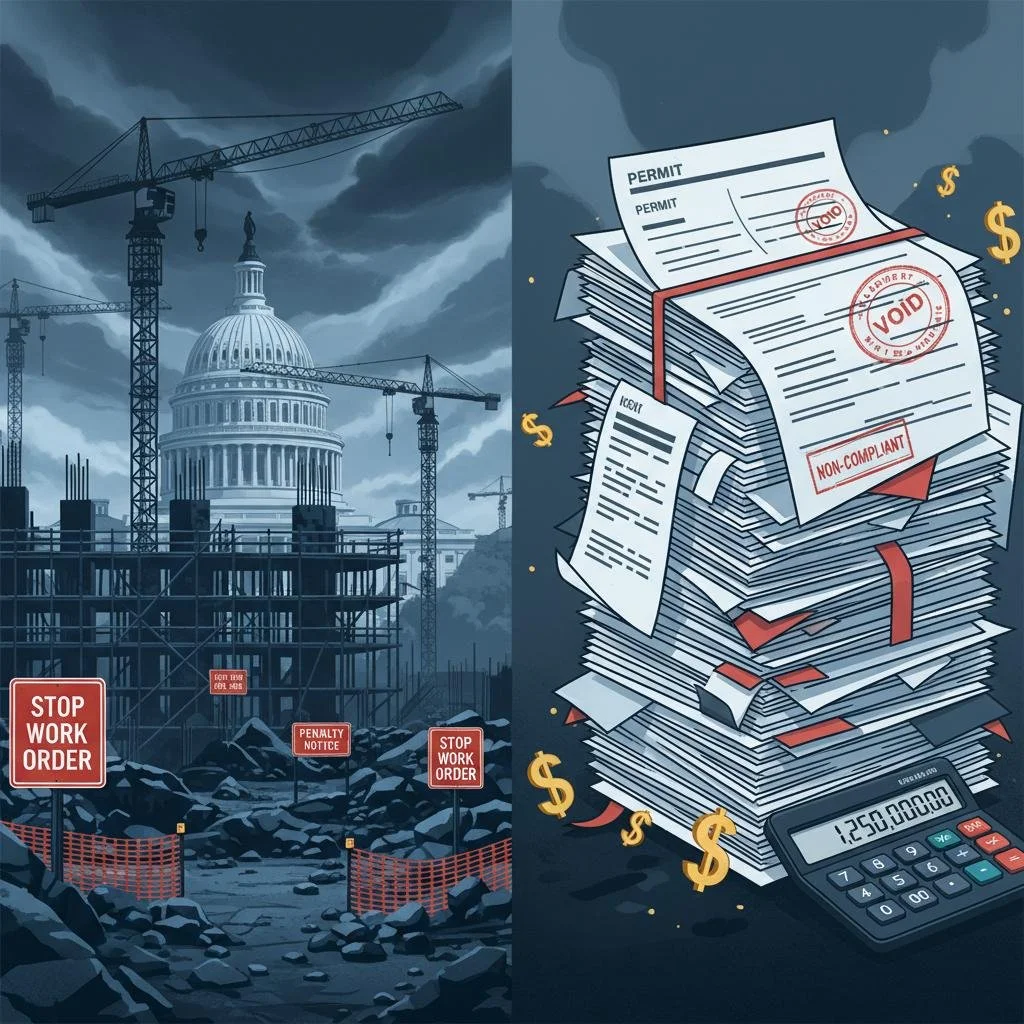7 D.C. Permits That Could Devastate Your Project Budget
Every contractor in Washington, D.C. has heard the horror stories - projects that went from profitable to financial disasters because of permit complications. After 25 years of navigating D.C.'s permit landscape and managing over 1,000 projects, I've seen which permits consistently catch contractors off guard.
Why This Matters Right Now
The D.C. Department of Buildings has tightened enforcement significantly in recent years. What used to be minor oversights now result in stop-work orders, hefty fines, and months of delays. With construction costs already at historic highs, permit mistakes can be the difference between profit and loss.
Here's the reality: 73% of D.C. construction projects experience permit-related delays, and the average cost overrun from permit complications is $28,000 per project. These aren't just statistics - they represent real contractors losing sleep, missing deadlines, and watching their margins evaporate.
1. Commercial Roofing Permits - The $50,000 Surprise
Commercial roofing permits are deceptively complex. Most contractors focus on the structural aspects but overlook the environmental compliance requirements. I've seen projects halted for months because contractors didn't account for stormwater management updates or failed to coordinate with DDOE requirements.
The real killer? Emergency repairs that turn into full replacements mid-project, requiring entirely new permit applications. Last month, I worked with a contractor whose "simple" roof patch became a $180,000 full replacement when inspectors discovered the existing structure didn't meet current codes.
Red flags to watch for:
Buildings constructed before 1990
Any roof work exceeding 25% of total roof area
Properties in flood zones or historic districts
Structures with existing HVAC modifications
2. Public Right-of-Way Permits - Where Small Mistakes Cost Big
These permits involve multiple agencies - DOT, public space, and often utilities coordination. The penalty structure is brutal: $500+ daily fines that accumulate fast. I've witnessed a simple sidewalk repair project rack up $15,000 in penalties because the contractor misunderstood the traffic control requirements.
The nightmare scenario: A contractor started work on a "minor" utility connection without proper DOT coordination. The project was shut down for 6 weeks while permits were sorted out, accumulating $21,000 in daily penalties plus lost labor costs.
Critical requirements often missed:
Traffic control plan approval (minimum 10 days advance notice)
Utility location verification through Miss Utility
Restoration bond requirements
Weekend/holiday work restrictions
3. Certificate of Occupancy - The Project Killer
You can't collect final payment without it, but CO permits often reveal issues that should have been caught months earlier. Fire safety updates, accessibility compliance, and mechanical system approvals can add weeks or months to your timeline when discovered late.
Case study: A restaurant renovation seemed complete until the CO inspection revealed the kitchen exhaust system didn't meet current fire codes. The fix required opening walls, rerouting ductwork, and a complete re-inspection process - adding 8 weeks and $35,000 to the project.
Common CO roadblocks:
ADA compliance gaps in older buildings
Fire safety system updates
Mechanical system certifications
Parking requirement calculations
4. Electrical Permits for Older Buildings - The Cascade Effect
Touching electrical in pre-1980 D.C. buildings often triggers a cascade of required upgrades. Panel replacements lead to service upgrades, which require utility coordination, which impacts your timeline and budget exponentially.
The cascade in action: What started as a $3,000 panel upgrade became a $25,000 project when inspectors required:
Service entrance upgrade (building too old)
GFCI installation throughout
Arc-fault breaker requirements
Grounding system updates
Buildings at highest risk:
Constructed before 1975 (knob-and-tube wiring era)
Properties with aluminum wiring
Buildings with federal box panels
Structures with shared electrical services
5. Plumbing Permits in Historic Districts - Double Jeopardy
Historic district projects face dual oversight - both building codes AND historic preservation requirements. I've seen bathroom renovations turn into $30,000+ projects when contractors discovered they needed specialized materials and methods to meet both sets of requirements.
Double approval nightmare: A Georgetown townhouse bathroom renovation required:
Standard plumbing permits through DCRA
Historic Preservation Review Board approval
Specialized period-appropriate fixtures
Custom millwork to hide modern systems
Multiple inspection cycles for both agencies
Historic districts with strictest requirements:
Georgetown Historic District
Capitol Hill Historic District
Dupont Circle Historic District
Logan Circle Historic District
6. Raze Permits - The Environmental Wildcard
Demolition seems straightforward until environmental testing reveals asbestos, lead, or soil contamination. The permit process can extend from weeks to months, and specialized abatement can multiply your costs by 300-400%.
Environmental surprise: A contractor budgeted $15,000 for a small building demolition. Environmental testing revealed:
Asbestos in floor tiles and insulation
Lead paint throughout
Soil contamination from old heating oil tank
Total abatement cost: $67,000
Timeline extension: 12 weeks
High-risk properties:
Buildings constructed before 1978 (lead paint)
Structures built 1940-1980 (asbestos)
Properties with basement oil tanks
Industrial or commercial sites
7. New Construction Permits - Death by a Thousand Cuts
Large projects face the most variables. Zoning compliance, utility connections, environmental impact, traffic management, and neighbor notifications create multiple failure points. Each revision cycle adds 30+ days to your timeline.
The revision spiral: A new construction project went through 7 revision cycles because:
Initial zoning interpretation was incorrect
Stormwater management plan needed updates
Traffic study requirements changed mid-process
Neighbor objections triggered additional reviews
Final cost overrun: $125,000
Timeline extension: 8 months
Most common revision triggers:
Zoning setback miscalculations
Height restriction violations
Parking requirement shortfalls
Green building compliance gaps
The Real Cost Isn't Just Money
Beyond direct costs, permit delays damage your reputation, strain client relationships, and tie up your crews. In today's competitive market, contractors who consistently deliver on time have a massive advantage.
Hidden costs of permit delays:
Crew downtime and reassignment costs
Material price escalation during delays
Client relationship damage and referral loss
Bonding and insurance complications
Cash flow disruption
The Patterns I've Observed
After managing over 1,000 D.C. projects, certain patterns emerge:
Projects most likely to face major permit issues:
Renovations in buildings over 40 years old
Work in historic districts
Projects involving multiple building systems
Emergency repairs that expand in scope
First-time D.C. contractors unfamiliar with local requirements
Contractors who avoid permit disasters:
Start permit research before bidding
Build relationships with agency staff
Use experienced local permit expeditors
Budget 20% contingency for permit complications
Front-load the most complex approvals
How to Protect Your Projects
The most successful contractors I work with follow three principles:
1. Front-load the Complexity
Address the hardest permit requirements first, not last. If your project needs zoning approval, environmental clearance, and utility coordination, start those processes immediately - even before finalizing your construction timeline.
2. Build Relationships
Having advocates within the agencies saves months of back-and-forth. Inspectors and plan reviewers remember contractors who submit complete, accurate applications. They also remember those who don't.
3. Plan for Contingencies
Budget 15-20% extra time and money for permit-related issues. The contractors who consistently profit from D.C. projects aren't the ones who bid lowest - they're the ones who plan most thoroughly.
Red Flags That Demand Expert Help
Call in permit expediting help immediately if your project involves:
Multiple agencies (DOT, DDOE, DCRA, utilities)
Historic district approvals
Environmental compliance requirements
Zoning variances or special exceptions
Emergency work that's expanding in scope
Your first major D.C. project
Your Next Steps
If you're currently managing D.C. projects or planning new ones, don't let permit complications derail your success. The investment in proper permit expediting typically pays for itself through faster approvals and avoided penalties.
Before you submit your next permit application, ask yourself:
Have I identified all required approvals?
Do I understand the revision process?
Have I built adequate time buffers?
Do I have relationships with key agency staff?
Am I prepared for environmental surprises?
The contractors thriving in D.C.'s market aren't necessarily the biggest or cheapest - they're the ones who understand that permit success is project success.
Get Expert Help Before It's Too Late
Don't let your next project become another permit horror story. M.C.G. Permit Consultants has been protecting contractors from costly permit mistakes since 2000.
Ready to safeguard your project?
Call us: (202) 729-8272
Email us: sayhello@mcgpermits.com
Get a free project evaluation: Click here to assess your permit risk
With 25+ years of D.C. permit experience and established relationships throughout the city's agencies, we help contractors avoid the costly mistakes that derail projects. Every day you wait increases your risk.
M.C.G. Permit Consultants - Simply Getting it Done.

